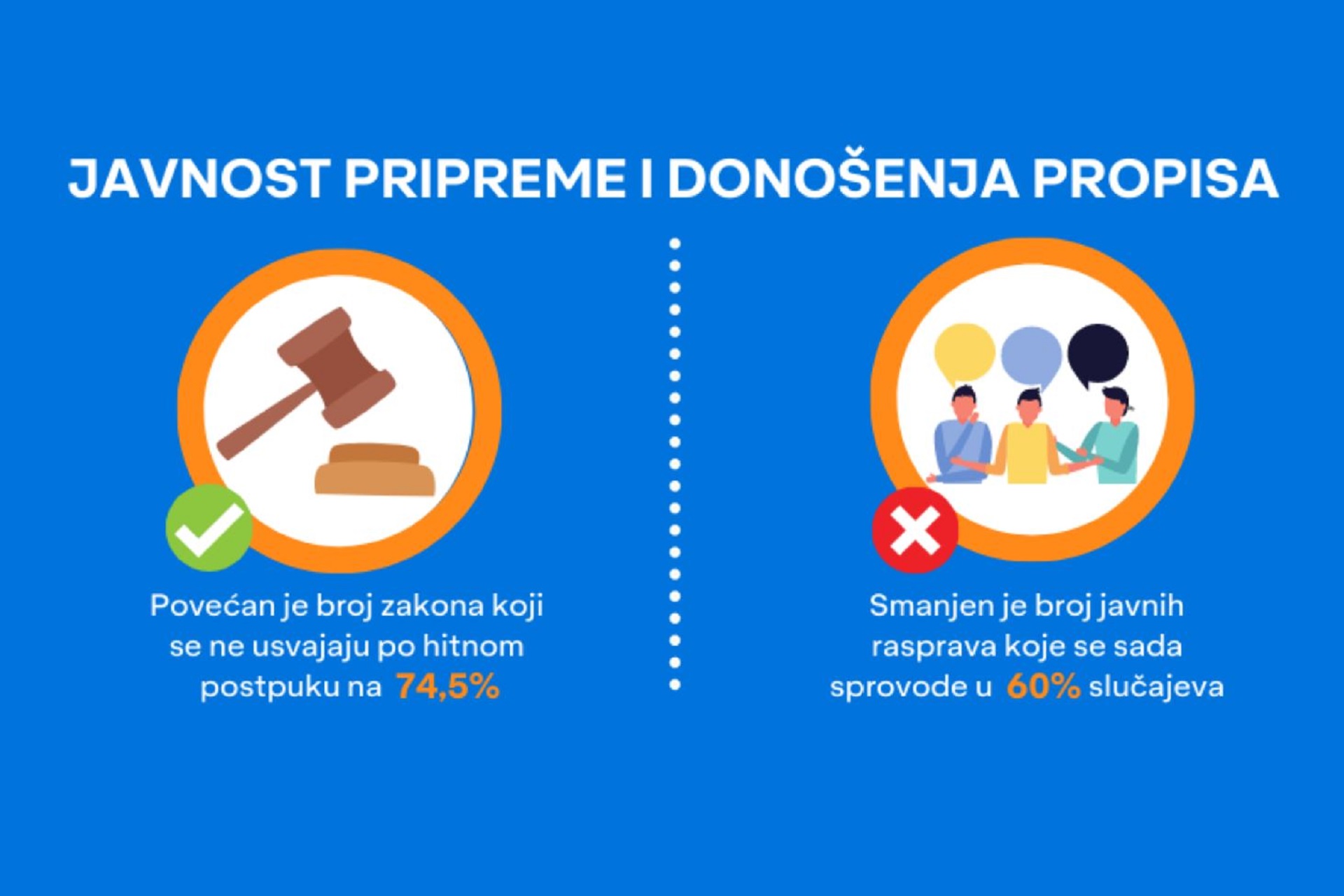Law-making process half way to the top
During the second year of the coronavirus pandemic, the Government of Serbia together with line ministries achieved partial result when it comes to the quality of the process of adopting and implementing regulations important for businesses, according to data from the Serbian Regulatory Index for 2021. With 47 out of 100 points, the performance is quite similar to the year before, and there has been no visible progress compared to the report from five years ago either.
In 2021, a total of 191 laws were passed, of which 74 had a direct or indirect impact on the economy. In order to know how it will specifically affect business, it was necessary for these regulations to contain an impact analysis, which was fulfilled in 72% of the laws, but less than half had a complete analysis. Also, only 15% of regulations had an adequate calculation of implementation costs and this is a big step backwards compared to 2020.
- On the other hand, great progress has been made in the segment of involvement of interested public in the preparation of regulations. Public hearings were represented in 95% of cases, unlike in 2020, when they were organized for just over half of the draft laws. This shows us that we are returning to normal flows compared to the first pandemic year, when only minor changes to the law were made. And what is especially good, only four were passed by urgent procedure, while in previous years it was the dominant practice - says Violeta Jovanović, NALED Executive Director.
According to her, improvements are also visible in the predictability of the application of regulations. In its plan for 2021, the government had 397 laws passed, of which 86 were adopted. Although this is only a fifth of the achieved goal, it is again better than in 2020, when only 11% of the planned laws were adopted. On the other hand, it also means that another 105 were adopted outside the plan, which indicates that the ministries fail to properly plan changes and thus contribute to the creation of an unpredictable environment for the economy. The frequency of amendments to the law has slightly worsened, so that laws are changed on average every two years.
- The segment that is the worst rated is the timeliness of law enforcement. Out of 111 bylaws important for full implementation of laws that affect the economy, only three were passed last year. Another fact to bear in mind ts that the average delay in passing the acts reached 990 days, which is more than 2.5 years - adds Jovanović.
Compared to 2020, somewhat lower, but generally satisfactory, the result was recorded in terms of communication between institutions and citizens and the economy. On average, ministries respond to more than half of the inquiries they receive, and are significantly more up-to-date when they receive a request for information of public importance - almost three quarters of ministries have responded to such requests. Also, three quarters of the ministries meet the criteria when it comes to the visibility of their sites, whether the most important content is sufficiently visible and whether the links are functional. Although regulations are readily available, they are not up to date in most ministries.
Compared to 2020, somewhat lower, but generally satisfactory result was recorded in terms of communication between institutions and citizens and businesses. On average, ministries respond to more than half of the inquiries they receive, and are significantly more up-to-date when they receive a request for information of public importance - almost three quarters of ministries have responded to such requests. Also, three quarters of the ministries meet the criteria when it comes to the visibility of their websites, whether the most important content is sufficiently visible and whether the links are functional. Although regulations are readily available, they are not up to date in most ministries.
The Regulatory Index also pointed out that a lot is expected from the new Law on Free Access to Information of Public Importance, which was passed last year. The law stipulates that the Commissioner gives opinions on draft laws and proposals of other regulations and public policy documents if they regulate issues that are important for exercising the right to access information of public importance. Also, it is prescribed in more detail which state authorities, local governments and public companies are obliged to respond to requests for access to information of public importance.



